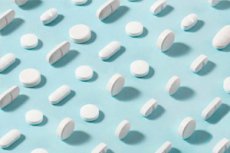Nye publikasjoner
Ny antipsykotisk formel reduserer vektøkning og øker serotoninnivået
Sist anmeldt: 02.07.2025

Alt iLive-innhold blir gjennomgått med medisin eller faktisk kontrollert for å sikre så mye faktuell nøyaktighet som mulig.
Vi har strenge retningslinjer for innkjøp og kun kobling til anerkjente medieområder, akademiske forskningsinstitusjoner og, når det er mulig, medisinsk peer-evaluerte studier. Merk at tallene i parenteser ([1], [2], etc.) er klikkbare koblinger til disse studiene.
Hvis du føler at noe av innholdet vårt er unøyaktig, utdatert eller ellers tvilsomt, velg det og trykk Ctrl + Enter.

970 millioner mennesker verden over sliter med psykiske lidelser. Men når den anbefalte behandlingen inkluderer antipsykotiske legemidler, inkluderer bivirkningene ofte ekstra kilo, noe som kompliserer en allerede vanskelig diagnose.
Nå viser en studie publisert i tidsskriftet Advanced Functional Materials av University of South Australia at antipsykotiske legemidler kan redesignes med et spesialdesignet belegg som ikke bare reduserer uønsket vektøkning, men også øker serotoninnivåene med mer enn 250 %.
Forskerne testet spesifikt lurasidon, et legemiddel som brukes til å behandle schizofreni og bipolar depresjon, og fant at de nye beleggene målrettet tarmmikrobiomet for å forbedre legemiddelopptaket med åtte ganger, samtidig som de overvant vanlige bivirkninger som vektøkning.
Beleggene er laget av ørsmå kjerne-skallpartikler laget av kostfiberen inulin og bioaktive mellomkjedede triglyserider. Inulinskallet forbedrer tarmmikrobiomet ved å gi en energikilde for tarmbakterier, mens de mellomkjedede triglyseridene letter absorpsjonen av legemidlet i blodet.
Dette er en banebrytende oppdagelse som har potensial til å forandre livene til millioner av mennesker over hele verden.
Ledende forsker Dr. Paul Joyce, fra University of South Australia, sier at mikrokapsler som målretter seg mot mikrober kan forbedre behandlingsresultatene for psykiske lidelser.
«De fleste pasienter med schizofreni eller bipolar lidelse får foreskrevet ulike antipsykotiske legemidler, som forårsaker betydelige bivirkninger ved å forstyrre tarmmikrobiomet – det mikrobielle økosystemet som naturlig koloniserer tarmen», sier dr. Joyce.
«Den mest merkbare bivirkningen er vektøkning, og mange pasienter ser ofte en økning i kroppsvekt på 10–15 % etter bare tre måneders behandling.»
«Fordi tarmmikrobiomet spiller en viktig rolle i å regulere generell helse, spesielt humør og kognitiv funksjon, gjør den negative effekten av disse stoffene på mikrobiomet dem ofte kontraproduktive.»
«I stedet for å forbedre humør og kognitiv funksjon, fører medisinene til en kaskade av forverret mental og metabolsk helse ettersom pasientene nå sliter med overvekt og psykiske helseproblemer.»
«Situasjonen forverres av det faktum at de fleste antipsykotika må tas sammen med mat for å være maksimalt effektive. Men for en svært sårbar pasientgruppe kan dette være vanskelig å oppnå, noe som gir de fleste pasienter suboptimale blodnivåer av legemidlene.»
«Det er tydelig at det er behov for nye strategier for å håndtere bivirkningene og behovet for å ta disse legemidlene sammen med mat – og det er det vi har oppnådd med lurasidon.»
«Denne studien viser at når antipsykotiske legemidler formuleres med våre nye smarte kjerne-skall-mikropartikler, økes absorpsjonen av legemidlet, noe som eliminerer behovet for å ta det sammen med mat, samtidig som mangfoldet og forekomsten av tarmmikrobiomet forbedres for å overvinne vanlige bivirkninger som vektøkning.»
«Det er viktig å merke seg at fordi vi ikke utvikler nye legemidler, men ombruker eksisterende legemidler, kan nye behandlinger raskt introduseres i klinisk praksis, og vi kan forvente dem innen de neste årene, i stedet for de 10 til 15 årene det tar for nye legemiddelmolekyler å bli godkjent av regulatoriske myndigheter.»
De neste trinnene inkluderer å teste effektiviteten til disse omformulerte legemidlene hos pasienter, med langsiktige mål om å utvide disse teknologiene til all psykisk helsebehandling, inkludert antidepressiva, for å redusere eventuelle bivirkninger.
